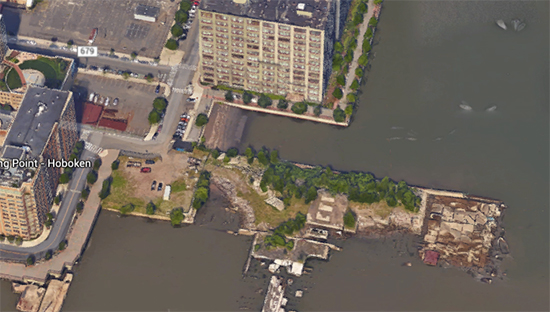12-1-2016 Update: Oral arguments will be heard by Appellate Court Part G Room 1114, Veterans Courthouse, 11th Floor, 50 West Market Street, Newark, NJ on Tuesday, December 13, 2016 at 9:30 am before Judges Yannotti, Fasciale and Gilson.
By Ron Hine | FBW | May 17, 2016
In December 2011, the New Jersey Department of Environmental Protection (NJDEP) issued a waterfront permit to the Shipyard Associates to build two eleven-story residential towers — the Monarch Project — on a Hoboken pier. This permit ran counter to the following items issued in 1997 on behalf of the 10-acre Shipyard Project: Hoboken Planning Board Planned Unit Development (PUD) approval, the Shipyard Associates/City of Hoboken developer’s agreement, and the original NJDEP waterfront permit.
In 1997, the Planning Board approvals, developer’s agreement and state waterfront permit all designated the pier — also known as Development Block G — as open space that included tennis courts, a tennis pavilion and the Hudson River Waterfront Walkway. The state permit and local approvals all required the Shipyard Associates to construct the open space at Development Block G after completion of the final units of this 1160-unit PUD.
Yet, after completing the last of the units in 2011, the Shipyard Associates flouted their agreement and approvals by seeking instead to build an additional 78 units — the Monarch Towers. Currently, there are five cases before New Jersey Superior Court, four of which are before the Appellate Division. The objectors — the City of Hoboken, Hudson Tea Building Condo Association (HTBCA) and the Fund for a Better Waterfront (FBW) — have all persisted in this marathon legal battle with the developer.
Of all the cases, the challenge to the NJDEP waterfront permit may be the next up for a ruling. Appellants City of Hoboken and HTBCA filed their briefs a year ago in May 2015 with the Appellate Division of New Jersey Superior Court. The NJDEP failed to hold a public hearing as they were required to do and ignored a long list of Coastal Zone Management regulations in granting this permit.
Section 7:7E-7.11 of the state regulations states: “The proposed structure must not block views . . . that are currently enjoyed from existing residents, roads, or pathways to the maximum extent possible.” Significant private and public funds have been utilized to construct the Hudson River Waterfront Walkway at the Weehawken Cove. The Monarch Towers would introduce a serious impediment to the remarkable views to the Hudson River and New York City skyline enjoyed by both the public using the Walkway and private residents at the Cove .
Section 7:7E-3.48 specifies open space requirements at the landward and waterward ends of piers. The Monarch developers fail to comply with this section of the regulations. The state also requires new buildings on piers to be built on structurally sound existing pilings which no longer survive support this pier, large sections of which have collapsed into the Hudson River.

The Monarch project violates a number of important NJDEP Coastal Zone Management regulations, including protecting views from the Weehawken Cove.
Although the developers claim that the pier is private land and they have the right to build on it, there are some interesting legal issues raised as to the public nature of the Hudson River and the piers over the river. Over 100 years ago, the state of New Jersey granted permission to maritime industries to operate on piers and at the water’s edge along the Hudson River. According to the Public Trust Doctrine, part of our common law that dates back to early Greek and Roman times, this is permissible for water-dependent uses yet what is being proposed is a non-water dependent use. Section 7:7E-3.50 of the Coastal Zone Management regulations address this issue: “Tidal waterways and their shores are subject to the Public Trust Doctrine and are held in trust by the State for the benefit of all the people, allowing the public to fully enjoy these lands and waters for a variety of public uses. Development that adversely affects lands and waters subject to public trust rights is discouraged.”
Shipyard developers David and Michael Barry also operate Pier 13 Hoboken, a beer garden. This pier, a few blocks south of the Monarch site, has a reputation for getting raucous at times. Recently, City officials discovered that Pier 13 Hoboken has restricted access to patrons only, thus failing to abide by an agreement with the City to provide open access to the public.
Related links
Final legal dispute over Monarch Towers reaches NJ Supreme Court
NJ Supreme Court will rule on Monarch Towers dispute
Appellate Court ruling disregards well-established New Jersey land use case law
Monarch Towers sparks legal arguments over automatic approvals, changed circumstances, etc.
Appellate Court will hear appeal of 3 Monarch Towers cases
City settlement would shower tens of millions in benefits on Shipyard developers
Settlement proposed to end 5 year legal battle over Monarch Towers
Did NJDEP ignore its own coastal zone regs in granting permit? Appellate Court to decide
‘Rapacious’ developer must defend broken agreement in Appellate Court
Monarch towers case goes to Appellate Court
Monarch Towers litigation grinds on as public opposition persists
Federal judge grants FBW opportunity to help defend Hoboken’s flood ordinances
Developers challenge Hoboken flood ordinance in federal court
Judge grants automatic approval for controversial Monarch Towers
Monarch Towers described as classic case of bait and switch
Shipyard’s plan to privatize pier


